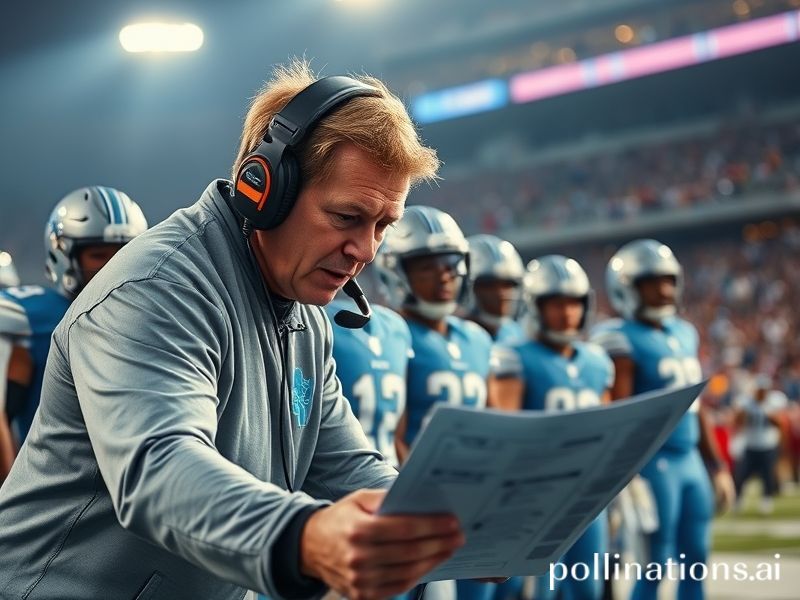The Global Chessboard of Detroit: How the Lions’ New Defensive Coordinator Accidentally Became a Geopolitical Player
In the grand geopolitical chessboard of 2024—where drones buzz over the Black Sea, BRICS nations eye the dollar like a wounded gazelle, and the Arctic melts faster than a politician’s promise—one might assume the Detroit Lions’ freshly minted defensive coordinator is about as globally consequential as yesterday’s TikTok trend. One would, of course, be gloriously wrong.
Enter Aaron Glenn—former NFL cornerback, current mastermind of mayhem in Honolulu blue, and, if you squint hard enough from certain diplomatic vantage points, an unwitting ambassador of American soft power. While COP negotiators in Dubai haggle over carbon credits that everyone will cheat on anyway, Glenn’s task is simpler yet paradoxically more brutal: prevent large men from Wisconsin and Minnesota from flattening his quarterback. The fate of the free world does not hinge on it, but the emotional barometer of millions does, which in the age of weaponized fandom is practically the same thing.
Glenn’s appointment carries the faint but unmistakable whiff of imperial succession. The Lions, long the NFL’s comic relief, have suddenly become the league’s most fashionable reclamation project—an underdog story so pure that even jaded Parisian intellectuals pause their Gauloises to check the score. Across Asia, where Super Bowl kickoff times arrive at breakfast and fantasy apps ding like temple bells, gamblers from Manila to Mumbai now track Glenn’s blitz rates with the same fervor they once reserved for the Hang Seng. A well-timed Cover-3 disguise can shift micro-economies; ask any Filipino call-center worker whose lunchtime parlay hinges on Aidan Hutchinson sacking Kirk Cousins before siesta.
Europe, meanwhile, watches with the detached amusement of a continent that already perfected football once. In London pubs, the Lions’ resurgence is discussed between sips of warm ale as proof that America occasionally gets things charmingly right—like jazz, or the First Amendment—before returning to the existential dread of Brexit 2.0. German fans, still basking in the afterglow of hosting Tom Brady’s farewell tour, regard Glenn’s aggressive schemes with the clinical interest they once applied to East German defensive driving manuals. Somewhere in Brussels, a Eurocrat drafts a regulation on helmet-to-helmet contact, just in case.
And then there is Africa, where satellite dishes bloom like desert flowers and Detroit’s Honolulu blue is visible from space against the Sahel’s rusty palette. Nigerian data vendors bundle Lions highlights with Premier League goals; Senegalese teenagers mimic Glenn’s press-coverage footwork in dusty lots, blissfully unaware that their mimicry constitutes intellectual property theft under American jurisprudence. In a Dakar cybercafé, a teenager named Mamadou live-tweets Glenn’s zone blitzes in Wolof, accruing followers faster than the Lions’ secondary allows third-down conversions. Soft power, meet soft coverage.
Not that Glenn himself is losing sleep over his inadvertent role in global cultural diffusion. His nightly film sessions are less State Department white papers and more medieval siege planning: how to collapse the pocket without exposing the flanks, how to disguise intent until the last possible heartbeat—a discipline that would impress any Ukrainian drone operator. The irony, of course, is that while real generals grapple with HIMARS logistics, Glenn’s war room worries only about whether the Packers will run a bunch formation on 2nd-and-7. Perspective is a luxury; paranoia is the job.
Ultimately, the Lions’ defensive coordinator matters because humans need something to matter. In a year when glaciers calve like cheap drywall and election cycles feel like recurring nightmares, the choreography of 11 men trying to tackle one slightly faster man becomes a manageable apocalypse—stadium lights standing in for the aurora borealis, crowd noise substituting for the Four Horsemen. Aaron Glenn isn’t saving the world; he’s merely giving it a three-hour reprieve from itself. And if that isn’t a diplomatic triumph, then nothing is.







